Warren Littlefield has been a champion of gender equality in television for decades. As the former president of entertainment at NBC, Littlefield consistently called on creators to add more women to their casts. (Littlefield is the reason S. Epatha Merkerson’s Anita Van Buren took over the squad on Law & Order, and Julia Louis-Dreyfus’ Elaine Benes joined the guys on Seinfeld, and Jennifer Aniston wasn’t replaced on Friends when there were complications with her being on a competing CBS show.)
We spoke to Littlefield — he's an executive producer of The Handmaid's Tale — about how the show lays the groundwork for a Testament's spinoff, but with a resume like his, we had to get a little nostalgic.
Below, we reminisce a bit about his work on your favorite NBC shows.
The Dipp: What’s it like being the man behind a generation’s TV obsessions?
Warren Littlefield: Thank you! [Laughs] That’s a very generous way of putting it. I don’t think of myself as a visionary. I think of myself as someone who is able to recognize a vision, whether it comes in [The Handmaid's Tale's] Bruce Miller’s writing or Reed Morano’s directing. I try to find people who have a vision and then protect that vision. I think because of my experience and my age, big corporations which write checks tend to trust my creative intuition. And hopefully what comes out of this are the strong, unique points of view that audiences embrace. I love that role, because the challenge is different every time.
Can we talk about how you’ve helped women in your former life at NBC? You often gave notes to show creators to add women to the cast of, for instance, Seinfeld, or Law & Order…
WL: Seinfeld, that worked out. [Laughs] And Law & Order, it was clear to me that the difference between success and failure would be inviting women to see themselves, not only in the cases, but also in women characters who were part of the system, part of crime and punishment. That turned out pretty well.
When we did L.A. Law, there was an exponential leap in female applicants to law school – a massive jump in applicants. That was attributed to L.A. Law and the cast of strong women who were fighting for justice at this high-rise law firm in Los Angeles. That was a great sense of the real world touching upon what television was doing.
I vacationed one summer in Cape Cod, and a childhood friend was there, and her sister and her sister’s family, and I was struck by how we live in a world where families are kind of blown apart and spread all over the world, but then they come together again. And that was the birth of Sisters, which celebrated how different those women were, yet how united they were, too. I grew up in a household with mostly women – two grandmothers, my mother, my sister. My dad was there, too, but he was quiet and off working all the time. So I just naturally enjoyed the love and respect of those women. That’s never left me.
Sisters featured a lot of frank talk about sex and relationships. So did Friends, but you ran into some resistance about that from NBC west coast president Don Ohlmeyer. He once gave a test audience a questionnaire, asking them if Monica was a slut, a whore, or a trollop. Not a lot of ambiguity there about how he felt about women having sex lives …
WL: That was a weird time. There was a lot of prejudice in that question. But the audience just said, “We like Monica!” I think as executives, we became stronger and rallied against his old world philosophy. Our resistance won out and we got what we wanted. I think the character of Monica was better for that, and certainly as a network, we were better for it.
Image: NBC
